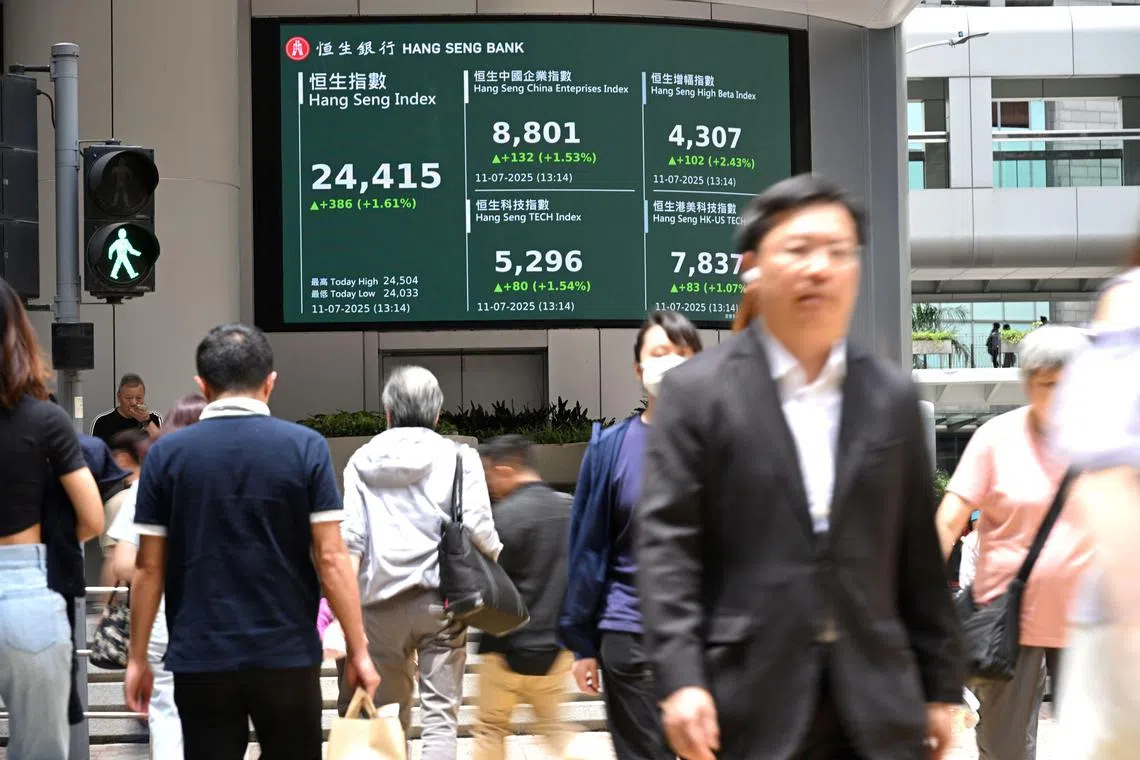Tencent investors eye path to record in cheap stock valuations
Sign up now: Get ST's newsletters delivered to your inbox

Tencent still has not erased the hit from China’s corporate crackdowns, which drove its stock to a five-year low in 2022.
PHOTO: AFP
Follow topic:
- Tencent's stock is undervalued, trading below its peak and peers like Meta, despite rising earnings estimates. Fund managers believe it will regain historical levels.
- AI advancements are expected to boost Tencent's advertising and gaming revenue, with the launch of Valorant Mobile anticipated to drive future growth.
- Analysts highlight Tencent's diversified portfolio and gaming sector strength as key factors for its resilience amid headwinds, evidenced by positive buy recommendations.
AI generated
HONG KONG – As tech megacaps around the world climb to new records, investors see a chance for Tencent shares to finally regain their former glory.
The Hong Kong-listed stock has added more than US$150 billion (S$192 billion) in market value in 2025, yet it remains 26 per cent below its all-time high. And it is trading at a substantial discount to global tech peers from Meta to Sony.
Tencent has more than cheapness going for it, with earnings estimates higher than ever ahead of the company’s results due on Aug 13, and big expectations for game titles including Valorant Mobile. So how close might the shares be to a new peak?
“It’s just a matter of time,” said Ms Jian Shi Cortesi, a fund manager at Gam Investment Management, which has Tencent as the largest holding in its flagship fund. The ubiquity of WeChat will make Tencent a long-term winner in e-commerce, and its stock valuations are “reasonable” on historical and peer comparisons.
Tencent still has not erased the hit from China’s corporate crackdowns, which drove its stock to a five-year low in 2022. It has not benefited as much as peers such as Alibaba Group from 2025’s artificial intelligence (AI) boom, nor has it suffered from extreme competition like Meituan.
Shares of Tencent are trading at 17.6 times estimated forward earnings, below their five-year average of 20 times. Meta and Sony are both at around 22 times, while Japanese video game company Nintendo trades at nearly 40 times – all three of those reached new record share prices last week.
“I have no doubt that Tencent will return to historical levels,” said Morningstar analyst Ivan Su. The market still is not factoring in how much AI will help the company’s advertising and gaming businesses, but “I think those earnings revisions will eventually come through”.
Even so, while many Chinese firms are seeing margins squeezed by price wars, the average estimate for Tencent’s 12-month forward earnings per share has climbed to an all-time high. Its earnings report is expected to show revenue rose 11 per cent in the three months ended June, a third-straight quarter of double-digit growth.
Advertising momentum is a key point, “especially if its AI efforts help drive growth momentum in its video accounts services”, said Ms June Lui, a portfolio manager at Polen Capital. “Tencent has a diversified business portfolio and that helps make it more defensive than peers from headwinds like tariffs and macroeconomic uncertainties,” she said.
Investors have turned more sanguine, with the cost of hedging against declines in shares of Tencent dropping from a peak in April. The street is overwhelmingly bullish on Asia’s second-largest stock, with its 66 buy recommendations the most in the region.
Beyond earnings, the market is looking forward to the Aug 19 launch of Valorant Mobile, a highly anticipated shooting game. The title should help drive Tencent’s revenue from later in 2025 through the first half of 2026, according to Goldman Sachs.
Meanwhile, “Delta Force is emerging as a potential franchise-level evergreen game”, analyst Ronald Keung wrote in a note last week. “Gaming remains a sector with strong-visibility cash generation – particularly at a time when much of China internet transaction-based platforms are seeing earnings pressure.” BLOOMBERG

